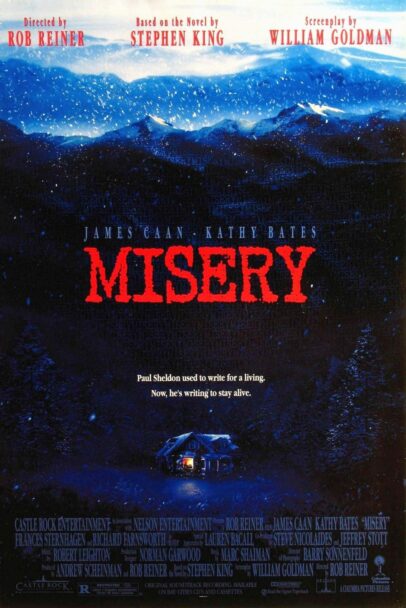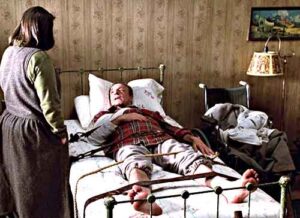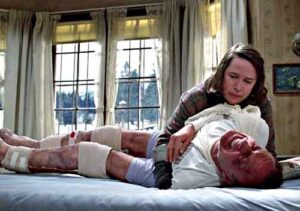Terry Gilliam, discussing THE FISHER KING (1991), stated that when he read its script “my fear was that someone like Rob Reiner would make it,” which would apparently result in a film that was “very lightweight and flat.” Then Reiner directed MISERY, a 1990 adaptation of a 1987 novel by Stephen King, is neither lightweight nor flat, although it is a mite bland, with the novel’s excesses toned down and any and all artistic flourish withheld.
MISERY (1990) Trailer
The novel emerged from a time when King was seeking to escape the horror label (it was published alongside THE TOMMYKNOCKERS, which was science fiction themed, and THE EYES OF THE DRAGON, a heroic fantasy). King has often singled out MISERY as his most personal book, for which reason he initially resisted Hollywood’s overtures. He gave in when Reiner, who previously adapted King’s novella “The Body” into STAND BY ME (1986), inquired. Sweetening the deal was a screenplay adaptation by the great William Goldman, and photography by the at-times-great Barry Sonnenfeld (whose last work as cinematographer MISERY was). The finished film ended up as one of the more successful Stephen King adaptations (at a time when it was practically a rule that King-adapted movies were bound to suck).
Paul Sheldon (James Caan) is a bestselling Colorado-based novelist known for a series of romance potboilers headlined by a woman named Misery. He decides to kill off the character and reorient his career with a new, non-genre effort. But as Paul drives down a rural road during a snowstorm, with his just-completed manuscript in tow, he crashes his car and is rendered unconscious. He’s rescued by Annie Wilkes (Kathy Bates), an obese nurse who’s been staking Paul, she being his “biggest fan.”
When he comes to in a bedroom of Annie’s house Paul finds that he’s immobilized from the waist down. Annie uses her nursing skills to take care of him, but makes a most unpleasant demand: that he burn his manuscript and write a new novel in which Misery is resurrected, with Annie reading each chapter when it’s finished and offering her input. As Annie’s mood swings grow increasingly extreme, and Paul learns about her checkered past (involving a lot of dead infants), he grows ever more determined to escape his confines. This leads to a most unpleasant encounter in which Paul is rendered fully immobile, in a manner that’s best experienced in its onscreen form rather than described.
In the meantime Paul’s agent (Lauren Bacall) launches a search for him. Buster (Richard Farnsworth), an aging Colorado sheriff, is charged with hunting Paul down, but pays a rather high price when he enters Annie’s house.
The film’s success was justified, as it’s an undeniably skilled piece of work. King’s central metaphor, about the oft-dysfunctional relationship between the writer and his audience, registers loud and clear, with MISERY being the ultimate example of a writer-and-his-muse movie (and so handily beating out the likes of THE INNER LIFE OF MARTIN FROST and the King-adapted SECRET WINDOW). For this we can credit William Goldman, who skillfully extracts all the good things from King’s novel while jettisoning those elements that don’t work (such as Paul’s climactic vow that “I’m gonna rape you, all right, Annie. I’m gonna rape you because all I can do is the worst I can do. So suck my book. Suck my book. Suck on it until you fucking CHOKE.”).
Rob Reiner, unfortunately, doesn’t fare quite as well. The story’s inherent claustrophobia was minimized severely, with the constant intercutting between Paul’s confined state and the exploits of the fully mobile Buster making for a pleasant, non-challenging watch. The interior of Annie’s house is rendered as ordinary and un-horrific as possible, with the expressiveness of Barry Sonnenfeld’s cinematography for Joel and Ethan Coen (whose signature style was heavily informed by Sonnenfeld) found here only in (very) brief snatches.
One area in which Reiner really lets loose is the nastiness, which despite having been toned down from King’s imaginings is quite impacting. That’s especially true of the film’s major gross-out set-piece: the breaking of Paul’s feet by Annie, which (speaking as one who saw the film during its initial run) invariably got a HUGE reaction from audiences.
Casting is another arena in which Reiner excels. The presence of legendary Hollywood hellraiser James Caan in the lead role is inspired, as it was no stretch for this most energetic of men to convey discomfort and desperation at being confined. Richard Farnsworth is quite endearing as Buster (enough so that his death scene registers one of the movie’s more impacting moments) and Frances Sternhagen provides solid support as his wife. Best of all is the presence of Kathy Bates, who won a much-deserved Oscar for her role despite being known at the time as a Broadway performer (she was reportedly cast at the suggestion of Goldman).
Annie exhibits a full litany of derangements, being obsessive, delusional, sadomasochistic and bipolar, and Bates adroitly navigates all those states despite the fact that she’s far from the subhuman grotesque described by King (who in the book likened Annie to “an idol in a perfervid novel,” as “Like an idol, she gave only one thing: a feeling of unease deepening steadily toward terror”). Bates even has moments in which she inspires sympathy for her character, although for the most part Reiner, like King, is careful to paint her in the darkest possible hue. Wisely included in its entirety is one of the book’s most striking passages, an impassioned monologue in which Annie descries an old serial she once viewed whose hero, despite what was shown onscreen, “DIDN’T GET OUT OF THE COCK-A-DOODIE CAR!” The scene in question is one of the film’s best, featuring a rare instance of visual flourish by Sonnenfeld (who brings us unnervingly close to Annie’s anguished face) and a delivery by Bates that’s beyond compare.
Vital Statistics
MISERY
Castle Rock Entertainment/Columbia Pictures
Director: Rob Reiner
Producers: Rob Reiner, Andrew Scheinman
Screenplay: William Goldman
(Based on a novel by Stephen King)
Cinematography: Barry Sonnenfeld
Editing: Robert Leighton
Cast: James Caan, Kathy Bates, Richard Farnsworth, Lauran Bacall, Frances Sternhagen, Graham Jarvis, Jerry Potter, Tom Brunelle, June Christopher, Julie Payne, Archie Hahn, Gregory Snegoff, Wendy Bowers, Misery the Pig



